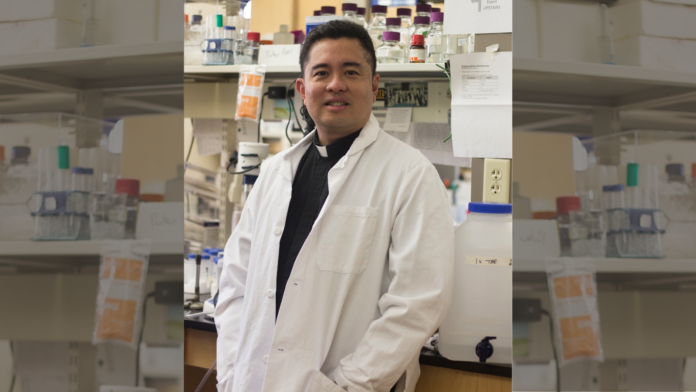A DOMINICAN priest-scientist is planning to test his Covid-19 vaccine—the first to be developed by a Filipino—at the University of Santo Tomas later this month.
Fr. Nicanor Austriaco, O.P., a molecular biologist and visiting professor in the Department of Biological Sciences, is working on an oral Covid-19 vaccine that would not involve injections, a health professional administering it and strict storage requirements.
“My hope is to develop a yeast system where Filipinos would simply take a pill, pop it in their mouth or mix it with their milk … some people tell me they’d rather mix it with their beer,” Austriaco in an interview with Crux Now.
He earlier likened it to drinking Yakult, a popular Japanese probiotic milk drink.
“You consume it, maybe every day for seven days. You don’t need a doctor or a nurse, you don’t need injections or biohazardous waste, you don’t need a refrigerator.”
Austriaco said the vaccine was still at the pre-clinical trial phase. According to the report, the priest-scientist was eyeing to return to UST this month to set up a testing program for the vaccine.
“This will be the first vaccine developed in the Philippines, by a Filipino for Filipinos. It’ll be a rough-and-ready, scrappy vaccine, but it will do what needs to be done for an impoverished country like my homeland,” he said.
The country plans to vaccinate up to 70 million Filipinos by the end of the year. It has so far received 1.125 million doses of donated vaccines.
About 370,000 health workers have been inoculated as of March 22, 21.71 percent of the 1,700,000 medical personnel prioritized in the country’s vaccination drive.
Bioethical considerations
Some Christians worldwide are faced with the judgment call on whether to get vaccinated or not due to the issue of some vaccines making use of fetal cell lines derived from a decades-old abortion.
The Johnson & Johnson Covid-19 vaccine, in particular, has made US bishops “raise questions about moral permissibility,” claiming the vaccine used stem cell lines from aborted fetuses not only in developing but also in testing and producing the vaccine.
The cell line in issue is PER.C6, which is composed of retinal cells isolated from a legally aborted fetus in 1985. However, the vaccines themselves do not contain any aborted fetal cells.
Austriaco stressed that the issue may make it difficult for Filipino Catholics to participate in vaccination programs as it poses an ethical dilemma to a country that is “pro-life by constitution and profoundly Catholic.”
“Not only is American society hoarding the vaccine, they’re making it intellectually, morally and psychologically difficult for significant numbers of other Catholics around the world who are scrambling for the scraps of vaccines left over to actually take them,” he said.
Getting vaccinated does not only address a public health issue, but also a wider social justice implication such as alleviating the economic burden, especially for the poor, he added.
The Vatican itself had noted that it would not be immoral to avail oneself of “morally controversial” vaccines, especially if no other options are available, Austriaco earlier said. Katherine Anne L. Escarilla and Sophia T. Sadang


0 Comments